Data centers face constant power threats. Outages mean chaos and lost revenue. How do these critical facilities ensure uninterrupted operation when the grid fails them?
Uninterruptible Power Supplies (UPS) are fundamental in data centers. They provide instant battery backup during outages, safeguarding against data loss, hardware damage, and costly service interruptions for continuous digital services.
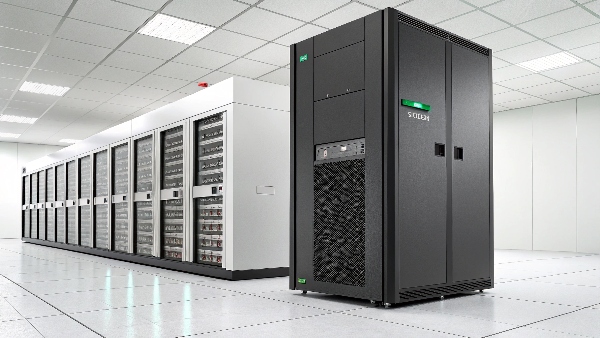
Transition Paragraph:
At Daopulse, with our decade of experience as an OEM/ODM manufacturer of UPS systems, we've seen the critical role these units play every single day. My core insight is that uninterruptible power supplies play a very important role in data centers. For someone like Mr. Li, a Procurement Manager ensuring a hospital's vital infrastructure stays online, reliable power isn't a luxury—it's a necessity that can impact patient care. This isn't just about keeping the lights on; it's about maintaining mission-critical continuity for services that people depend on.
How Widespread Are UPS Systems in Data Centers Today?
Considering the critical nature of data centers, are UPS systems optional? Or are they a universal standard found protecting virtually every server rack from power instability?
Virtually every data center, from small server rooms to hyperscale facilities, utilizes Uninterruptible Power Supply (UPS) systems. They are a foundational component for ensuring operational uptime and protecting valuable IT assets.
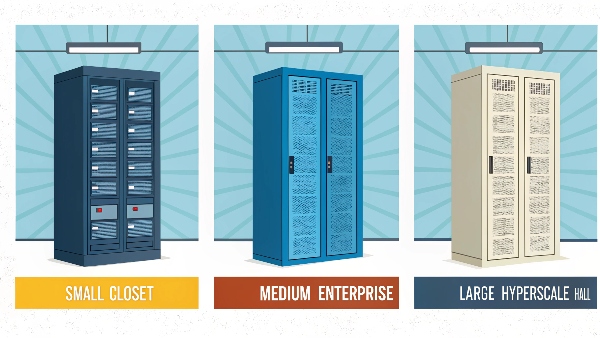
Dive deeper Paragraph:
The question "How many data centers does UPS have?" can be a bit confusing. If "UPS" refers to the well-known global logistics company, they certainly operate numerous data centers for their extensive global operations. However, in our world of power protection, "UPS" stands for Uninterruptible Power Supply systems. From this viewpoint, the answer is: almost every single one. My experience at Daopulse, serving global brands and wholesalers, confirms this without a doubt. My insight that uninterruptible power supplies play a very important role in data centers is built on observing this near-universal adoption.
Why this widespread use? Several key reasons stand out:
- Extreme Data Sensitivity: Data centers are the guardians of critical information. Any loss or corruption of this data can have severe consequences, ranging from financial penalties to reputational damage.
- Constant Service Uptime Demands: Modern businesses and services rely on 24/7 availability. Downtime is no longer acceptable to end-users and can translate directly into lost revenue.
- High Cost of IT Equipment: Servers, storage arrays, and networking gear represent significant capital investments. UPS systems protect this valuable hardware from damaging power anomalies.
Consider the application of UPS across different scales:
| Data Center Tier | Likelihood of UPS Presence & Sophistication | Typical UPS Role & Configuration |
|---|---|---|
| Small Server Closet | Very High | Protects a few servers, essential network switches, and storage. Often single, smaller kVA units. |
| Enterprise Data Center | Universal | Provides conditioned, redundant backup power for entire rooms or dedicated data halls. Often modular N+1 or 2N systems. |
| Hyperscale Facility | Universal & Extremely Sophisticated | Massive, highly redundant, and exceptionally efficient UPS architectures, sometimes supporting IT loads equivalent to a small town. |
The scale and complexity of the UPS solution might vary dramatically, but the fundamental need for robust, uninterruptible power protection is a constant across the entire spectrum of data center operations. As an OEM/ODM manufacturer, we provide solutions ranging from compact units for edge deployments to large, patented technology modular systems designed for these diverse and demanding environments, including both lead-acid and lithium battery options.
What is UPS in facility management?
Facility managers juggle many systems. Is a UPS just another box to them? Or does it play a more strategic, integral role in their daily operational concerns?
In facility management, a UPS is a critical infrastructure component. It ensures continuous power to essential building systems and IT loads during outages, preventing disruption and supporting overall operational resilience.
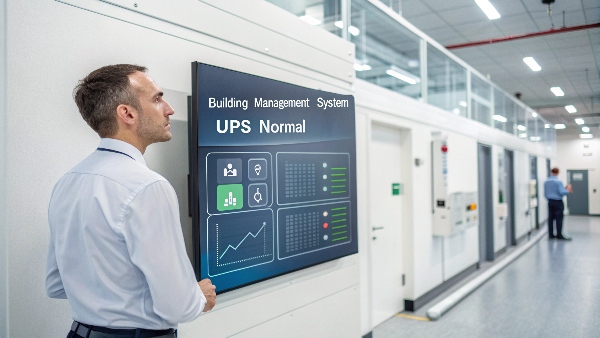
Dive deeper Paragraph:
For a facility manager overseeing a building that houses a data center, or even just significant IT infrastructure, an Uninterruptible Power Supply (UPS) system is far more than just another piece of electrical equipment. It's a cornerstone of their strategy for operational stability and risk mitigation. My core insight that uninterruptible power supplies play a very important role in data centers directly impacts the responsibilities and concerns of facility management. They view the UPS as a key enabler in maintaining the building's core functions, especially those critical to the IT load.
Here are key aspects of a UPS from a facility manager's perspective:
- Assurance of Power Continuity1: The UPS is the immediate first responder to utility power failures. It ensures that critical loads—servers, network gear, essential cooling units, security systems—remain powered without interruption. This vital window of battery operation allows time for backup generators to detect the outage, start up, and stabilize.
- Protection of Building and IT Assets: Beyond just outages, the UPS conditions incoming power, shielding all connected downstream equipment from sags, swells, spikes, and electrical noise. This protects not only the IT load but potentially other sensitive building systems tied into it.
- Lifecycle Management: Maintenance and Monitoring2: Facility managers are typically responsible for the planned preventive maintenance of UPS systems. This includes regular battery health checks (whether lead-acid or lithium), performance tests, and vigilant monitoring of system alerts to ensure the UPS is always ready. At Daopulse, we often collaborate with facility teams to establish effective maintenance protocols for our CE, RoHS, and ISO certified systems.
- Strategic Capacity Planning: As the facility's power demands evolve, or as the data center within it grows, facility managers must assess if the existing UPS capacity is sufficient or if upgrades are needed.
- Contribution to Energy Efficiency3: Modern, high-efficiency UPS systems can contribute significantly to a facility's overall energy management goals, reducing operational electricity costs.
- Adherence to Safety and Compliance: Ensuring that UPS installations and maintenance practices meet all relevant electrical safety codes and industry standards is a critical responsibility.
Essentially, the UPS is a high-value, critical asset that facility managers depend upon to keep the data center environment, and often connected parts of the wider building infrastructure, safe, continuously powered, and fully functional.
| UPS Consideration for Facility Manager | Importance Level | Key Action/Concern |
|---|---|---|
| System Reliability & Availability | Paramount | Regular testing, battery integrity, proactive maintenance, swift fault response |
| Sufficient Battery Runtime | Very High | Must bridge the gap to generator power or allow for safe, orderly shutdown of all systems |
| Comprehensive Monitoring & Alerting | High | Immediate, clear notification of power events, system faults, or battery issues |
| Total Cost of Ownership (TCO) | Medium to High | Balancing initial investment (e.g., lead-acid vs. lithium) with long-term operational and maintenance costs |
| Scalability & Future-Proofing | Medium | Ability to adapt to changing load requirements without wholesale replacement |
Why are UPS systems critical for data center operations?
We've touched on protection, but let's dig deeper. What are the fundamental reasons why a UPS isn't just advisable, but absolutely essential for any data center operation?
UPS systems are critical because they provide immediate, clean power during outages. This prevents catastrophic data loss, hardware damage, and service interruptions, ensuring the continuous, reliable operation data centers demand.
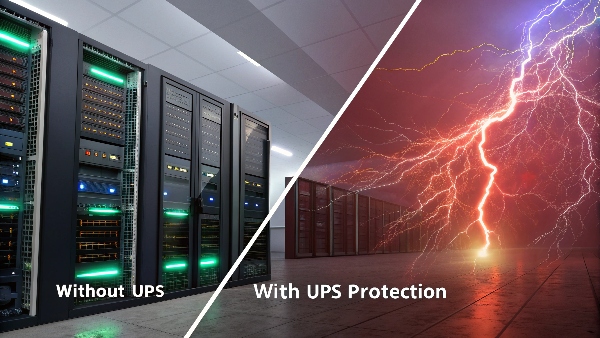
Dive deeper Paragraph:
The absolute criticality of Uninterruptible Power Supply (UPS) systems for data center operations comes down to one simple fact: IT equipment is extremely sensitive to power interruptions and poor power quality. My entire professional focus at Daopulse, designing and manufacturing high-quality power solutions, is built on this reality. This reinforces my unwavering insight: uninterruptible power supplies play a very important role in data centers. They are not a "nice-to-have"; they are a foundational requirement for survival and success in the digital age.
Let's break down why they are indispensable:
- Zero Tolerance for Operational Downtime: In today's always-on digital world, businesses and their customers demand 24/7/365 service availability. Even a flicker of power, lasting mere milliseconds, can crash servers, disrupt network connectivity, and bring entire applications and vital services to a screeching halt. An online UPS provides that seamless, instantaneous transition to battery power, ensuring absolutely zero interruption to the critical IT load.
- Preservation of Data Integrity: Data is often a company's most valuable asset. If power is abruptly lost while data is being actively written to disk arrays, processed in server memory, or transiting the network, it can lead to irreversible file corruption, incomplete database transactions, and devastating permanent data loss. A UPS allows systems to continue operating through short outages or, in the case of a longer event, provides time for an orderly, graceful shutdown, preserving data.
- Proactive Hardware Protection: Utility power from the grid is rarely perfect. It can be subject to sags (brownouts), surges, voltage spikes, electrical noise, and frequency variations. These power quality issues can inflict significant stress on the delicate electronic components within servers, storage systems, and networking gear, leading to premature failures and increased hardware replacement costs. An online double-conversion UPS (our specialty at Daopulse) continuously conditions incoming power, regenerating a clean, stable, and precise sine wave output, thus extending equipment lifespan and minimizing unexpected hardware failures.
- Essential Bridge to Generator Power: While backup generators are designed to provide long-term power during extended utility outages, they inherently require some time (typically from a few seconds to a minute or more) to start up and stabilize their output. The UPS batteries are critical for covering this "start-up gap," ensuring the load sees no interruption.
- Enhanced Operational Stability and Confidence: Knowing that a robust, reliable UPS system is in place allows data center operators and IT managers to manage their critical environments with significantly greater confidence. It reduces the constant stress and uncertainty associated with unpredictable utility power.
Attempting to run a data center without an adequate UPS is like navigating a minefield blindfolded—it's not a matter of if disaster will strike, but when.
What is a PDU in a datacenter?
Power from the UPS needs to reach many devices. How is this managed efficiently and safely within the densely packed racks of a modern data center environment?
A Power Distribution Unit (PDU) in a data center is essentially a robust, intelligent power strip. It distributes the UPS-conditioned power to multiple servers and network devices within a rack.
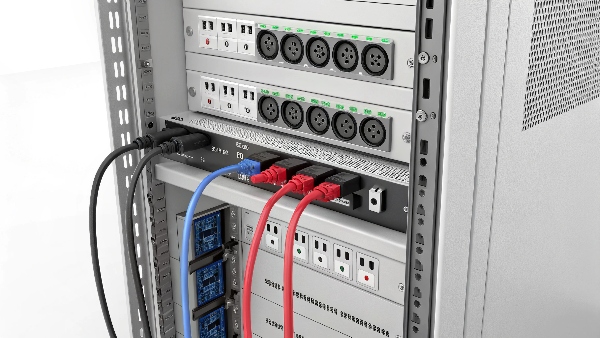
Dive deeper Paragraph:
While the Uninterruptible Power Supply (UPS) ensures that a clean, continuous, and reliable source of power is available to the data center, the Power Distribution Unit (PDU) takes on the equally crucial task of efficiently and safely delivering that conditioned power to individual pieces of IT equipment housed within server racks. My work at Daopulse primarily focuses on the UPS itself, but we fully understand that PDUs are the essential next link in the critical power chain. The fundamental importance of the UPS, as highlighted by my insight that uninterruptible power supplies play a very important role in data centers, is perfectly complemented by the PDU's role in effective and manageable power distribution at the rack level.
Data center PDUs are engineered to be far more sophisticated and robust than typical household power strips. They are specifically designed for:
- Handling Higher Power Densities: They are built to safely manage the significant aggregate power loads of multiple high-performance servers, storage units, and network switches consolidated into a single rack.
- Ensuring Maximum Reliability: Constructed with high-quality, durable components, PDUs are designed for continuous, fault-tolerant operation in demanding 24/7 environments.
- Optimized Form Factors: PDUs come in various forms, most commonly as vertical (0U) units that mount along the side of a rack or horizontal (1U/2U) units that fit into standard rack spaces, maximizing space for IT gear.
- Diverse Outlet Types and High Outlet Quantity: They offer a range of industry-standard outlet types (e.g., IEC C13, IEC C19, NEMA) and provide a high number of outlets to accommodate many devices.
Furthermore, modern data centers increasingly utilize "intelligent" or "managed" PDUs, which offer advanced features crucial for effective data center management:
- Remote Power Monitoring: These PDUs can accurately measure and report power consumption (amperage, voltage, wattage, kilowatt-hours) at the PDU level, circuit level, or even for each individual outlet. This data is invaluable for load balancing, capacity planning, identifying "ghost servers," and driving energy efficiency initiatives.
- Remote Outlet Switching: A key feature is the ability for administrators to remotely turn individual outlets on, off, or cycle power to them. This is extremely useful for rebooting unresponsive servers or other equipment without requiring physical intervention in the data hall, saving time and operational expense.
- Environmental Monitoring Integration: Some intelligent PDUs can connect to environmental sensors (temperature, humidity, airflow) to provide a more holistic view of conditions within the rack.
- Proactive Alerting: They can be configured to send automated alerts (e.g., via SNMP, email) for predefined conditions such as overloads, threshold breaches, or environmental alarms.
| PDU Category | Core Functionality | Key Data Center Benefit |
|---|---|---|
| Basic PDU | Simple power distribution to multiple outlets from one input | Cost-effective, reliable basic power delivery to rack devices |
| Metered PDU | Displays local power usage (PDU or circuit level) | Aids in manual load balancing and identifying available capacity |
| Monitored PDU | Provides remote network monitoring of power usage | Enables remote tracking of power consumption for planning/efficiency |
| Switched PDU | Allows remote on/off/reboot control of individual outlets | Facilitates remote power cycling, reducing need for site visits |
| Managed/Intelligent PDU | Combines monitored & switched features, plus more advanced analytics | Comprehensive remote control, detailed power analytics, proactive alerting, better capacity management |
PDUs work in direct partnership with UPS systems. The UPS provides the clean, resilient power, and the PDU ensures that this vital power is distributed effectively, intelligently, and safely to every critical device within the data center's racks.
Conclusion
UPS systems are indispensable in data centers, providing the critical bridge during power failures. They ensure operational continuity, protect valuable data, and safeguard expensive IT hardware investments.
-
Explore this link to understand how to maintain power continuity effectively, ensuring critical systems remain operational during outages. ↩
-
This resource will provide insights into best practices for UPS maintenance, ensuring reliability and longevity of your systems. ↩
-
Discover how modern UPS systems can enhance energy efficiency, leading to significant cost savings and sustainability benefits. ↩

